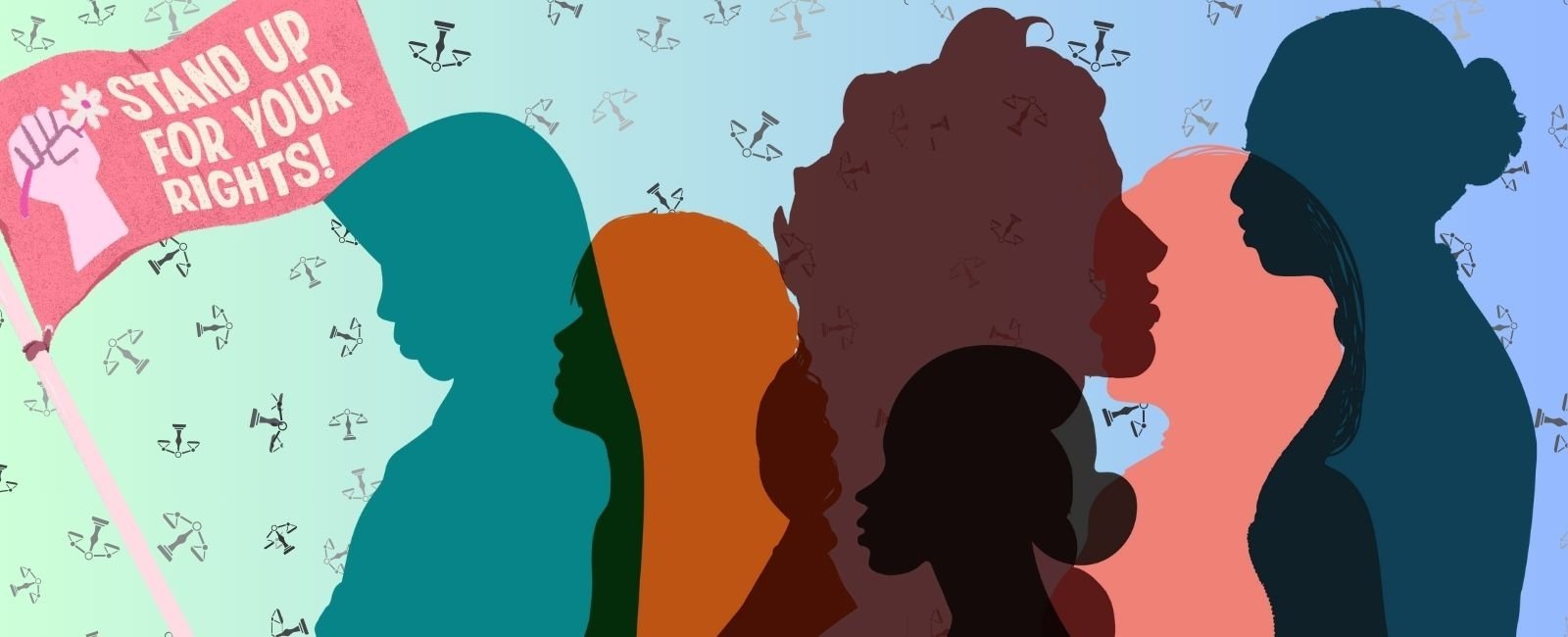Cutting through patriarchal chains and bureaucratic red tape with legal edge
Awareness of laws is key — women must be informed of their rights, and state must ensure their protection and justice

"If only women paid more attention to important documentation and their rights instead of frivolous things they wouldn’t be suffering."
This was my friend's husband's response when I casually asked about the required documents for legal proceedings soon after my husband's death. Despite the derogatory tone, the words lingered in the back of my mind.
With time, it made more sense. Women in Pakistan, like other parts of the world, "survive" in an extremely patriarchal society. She has to be supported by male family members, or else, her existence on paper and otherwise, remains questionable.
Patriarchy is a weapon of silence, pushing women into corners, suppressing their dreams, forcing conformity to identity-erasing roles, and stripping them of financial stability and legal rights. As if that weren’t enough, it also deprives them of their bodily autonomy.
Beenish* from Karachi told Geo.tv that following her divorce she had to change her address on the Computerised National Identity Card (CNIC). National Database and Registration Authority (NADRA) refused to do so until her brother was present in person, she even tried to use her personal contacts for assistance but to no avail.

"My brother had to travel all the way from Dubai to verify that I am his sister and that the address I provided is correct. Despite being an adult, I still have to depend on male family members. What if, God forbid, they were not around? Would I be denied the right to update my own address?" Beenish* said frustratingly.
"Also, while I made the attempt from Daharki, where I was posted, I could not stand the kind of humiliating questions the Nadra officer asked. I had to hear why I left him. I am a bad example for other women. He asked me to come with a male family member next time," she said recounting her embarrassing ordeal.
If a woman dares to seek justice, patriarchy ensures hurdles. She must either fight to be heard or rely on a man to stand beside her. Not to forget, the relationship of the man accompanying her will be questioned too. Otherwise, the file is shrouded in thick layers of red tape and buried deep in the crypts of bureaucracy, forcing the applicant to do countless futile rounds of these government offices.
Dr Fatima Ali Haider, founder of The Grief Directory, shed light on her struggles as a widow whose husband and son were killed in sectarian violence.
"Initially, the police informed me about the incident, but after that, I received no updates on the criminal proceedings. While the men engaged with the police, I was pushed aside as a grieving widow, left to deal with other pressing issues on my own, without any support," she told Geo.tv.
Victims, Dr Fatima added, have a right to information and participation in criminal and legal proceedings involving their loved ones.
"The state and the family denied me that right, a classic example of gender discrimination and violation of basic rights."
Lamenting, she said the legal loopholes that deny mothers automatic guardianship of their children after the father's death, forcing them to seek it through the courts should be plugged.
"Despite family support for my children's guardianship, I later learned I needed court permission to take them abroad for my study trip — it’s an utter invalidation of a mother’s natural rights and authority," she said.
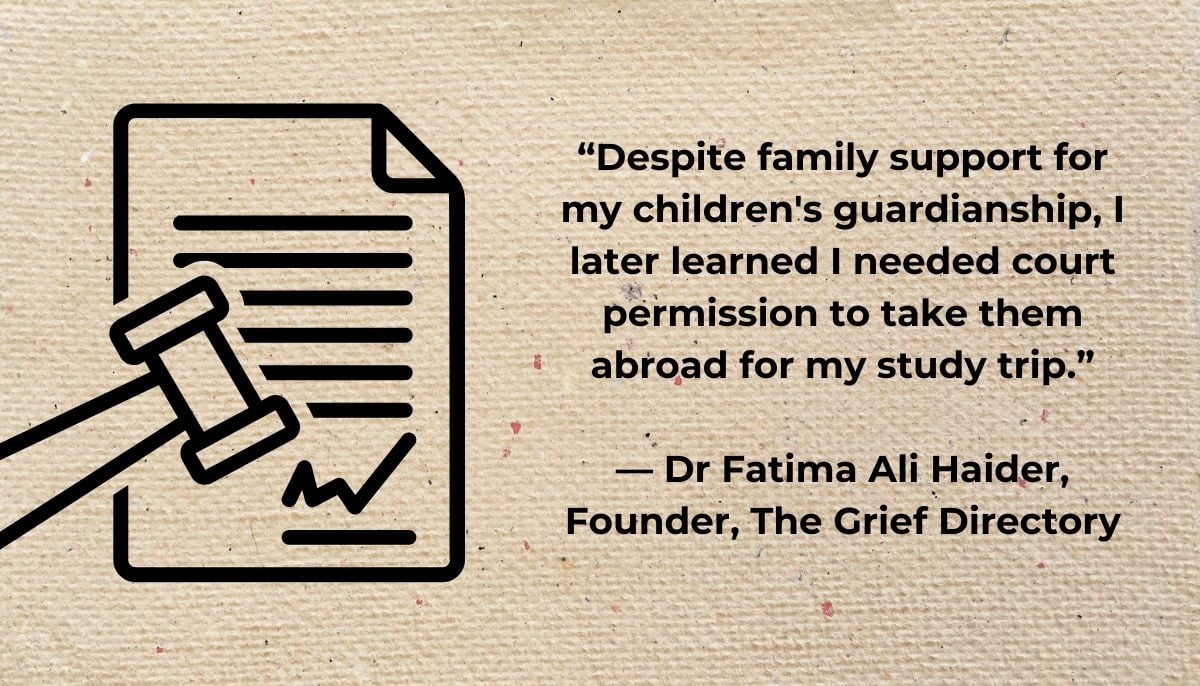
Every year, Pakistan marks International Women’s Day with zeal, yet it risks becoming mere tokenism as women endure systemic injustice. Rather than symbolic events, the government must focus on real empowerment. Activists raise awareness and push for economic inclusion, but their efforts alone aren’t enough.
There are many laws in place for their protection, but women still remain unaware of them. The government must step in and create awareness through campaigns such as those for polio, breast cancer, and smog, which have proven to be helpful.
It should also sensitise its officials and staff in each department on how to engage with justice-seeking women. Women, too, need to make an effort to do their homework.
Building on these insights, the Law Clinic at the School of International Law — an Islamabad-based law college — shared its experiences handling pro bono cases, shedding light on the legal struggles faced by women.
According to the Law Clinic, the Guardian and Wards Act, 1890 primarily governs the appointment of guardians for minors, often favouring male guardians, typically paternal relatives.
It added that in practice, courts tend to uphold male guardianship based on cultural norms.
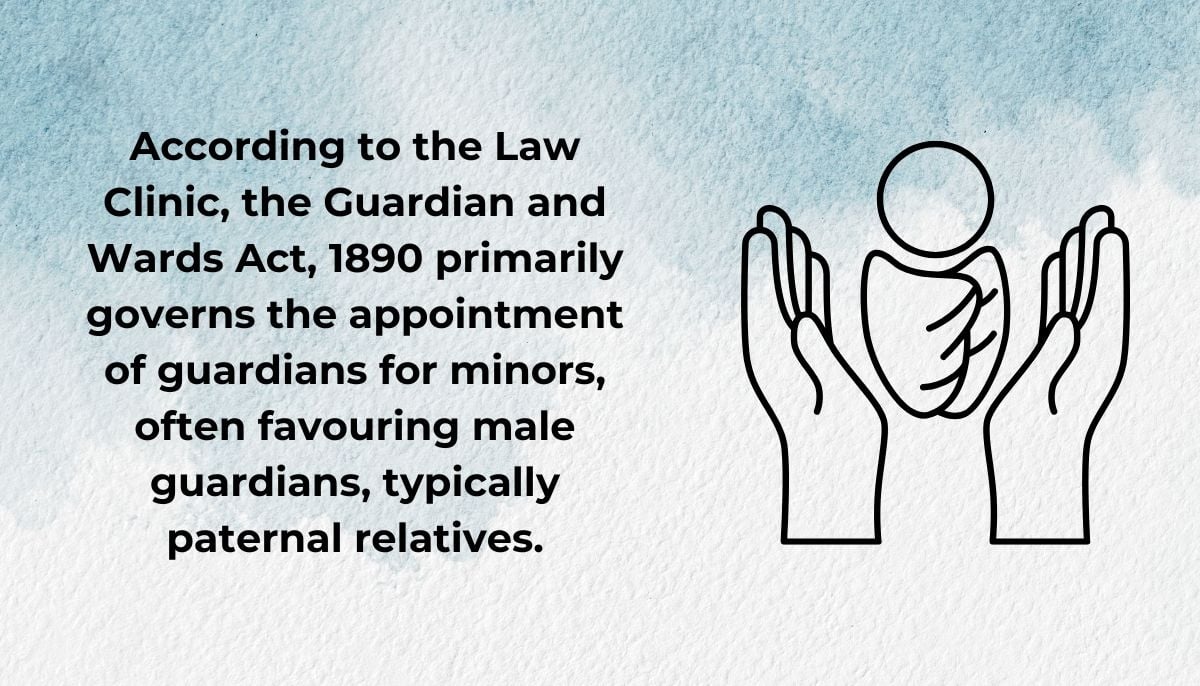
“To address this, amendments should explicitly recognise the mother as the natural guardian of her children, regardless of the presence of male relatives.
“Additionally, gender-based preferences in guardianship decisions should be removed, ensuring that the welfare of the child remains the primary criterion.
“Similarly, the Muslim Family Laws Ordinance, 1961, while not explicitly mandating male guardianship, leaves gaps that allow customary practices to dominate.”
The Law Clinic said that these included requiring male guardians for a widow’s remarriage or financial decisions.
“To rectify this, provisions should be added to affirm a widow’s autonomy over her personal and financial matters without the need for a male guardian’s consent.”
Furthermore, it said that the law should clearly establish that a mother holds equal guardianship rights over her children, ensuring gender equality in legal guardianship matters.
“Even in Saudi Arabia, significant reforms were introduced in 2019 to remove the requirement for a male guardian in matters such as travel, employment, and legal documentation, allowing women greater autonomy.”
The Law Clinic further explained that fast-track courts could be set up to speed up the process and help resolve women’s rights cases related to inheritance disputes, sexual violence and guardian issues on an immediate basis.
“The FTSCs (Fast Track Special Courts) were set up in India after the 2012 New Delhi gang rape case, ensuring quicker convictions.
“As a result, conviction rates improved, and victims received faster justice; however, challenges remain in rural areas due to police inefficiencies.
“While South Africa too has gender-based violence courts which helped in reducing delays in domestic violence cases, improving conviction rates,” The Law Clinic officials added.
Talking to Geo.tv, Khawar Mumtaz, former chairperson of the National Commission on the Status of Women (NCSW), said, “Women have to put up with the systemic injustice as soon as they enter the world.”
"A girl is marginalised from birth, with her registration documents ignored — B-Forms and CNICs left undone — assuming she’ll get married one day and never need them," said the senior women's rights advocate.
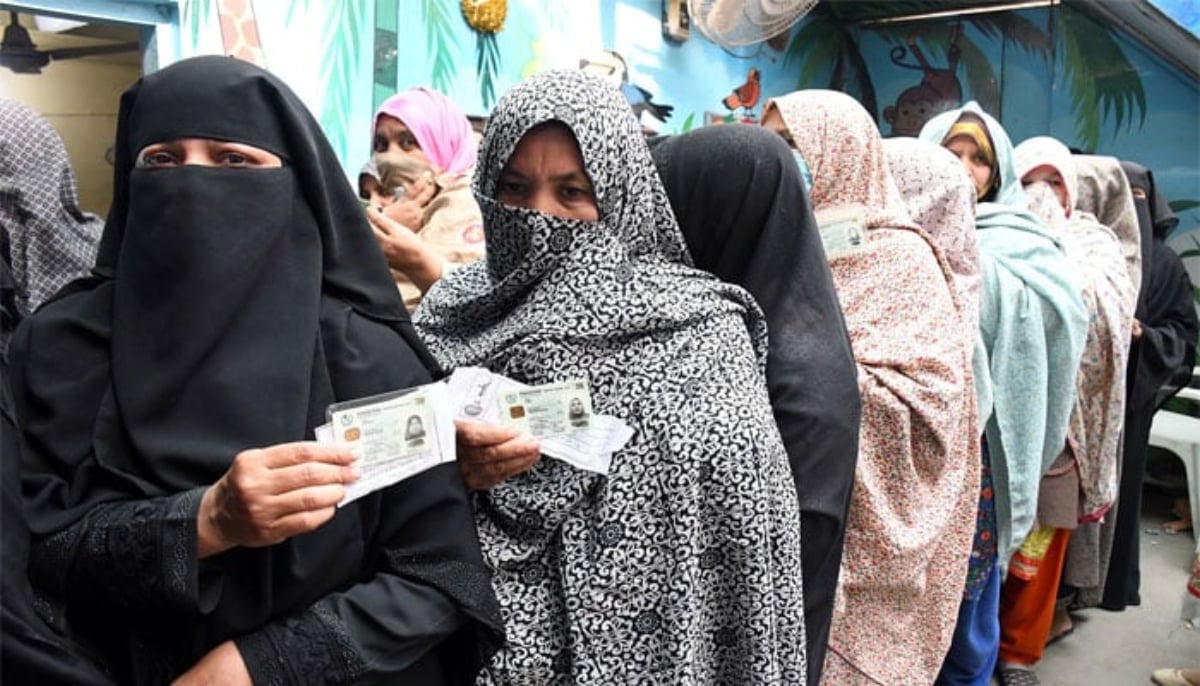
She added that things were, however, changing gradually, as at least women were getting their CNICs registered so they could benefit from the Benazir Income Support Programme (BISP).
"But we still come across numerous cases where men control women through that, too, by taking away their money," she said lamenting.
Bushra Khaliq, the executive director of Women in Struggle for Empowerment (WISE), which works to uplift marginalised women in society, told Geo.tv that despite registering for the programme, women are still deprived of their rights.
"Many women must bribe to receive BISP payments but stay silent, grateful for any amount. Over time, they’ve learned it's unsafe to take cash home, so they spend it on rations immediately,” she said.
Khaliq added that in some cases male family members accompanying women to the BISP office snatch the meagre amount from them immediately.
Documentation, therefore, is very important for women to support them in their rights that are enshrined in the law and Shariah, according to her.
"CNIC cards also help identify if a woman is of legal age to get married. Punjab has finally come up with a law that prohibits under-18 marriages, but we want to take this a step further in making CNIC mandatory at the time of nikah to ensure the bride is not under the legal age," Khawar, the former NCSW chief, further added.
She stressed the need for government-issued awareness brochures in schools, colleges, and union councils to educate young women about their rights and essential documents for securing their future. Here are key documents every woman should have or be aware of until legal reforms progress:
- Birth certificate and B-Form.
- Get yourself registered with Nadra at the age of 18 with your correct name and details.
- Make sure to read your marriage certificate (white sheet) and get a copy of it. A clause in nikkahnama on the right to divorce must not be removed. Make sure to get your certificate registered from the union council.
- Get your marriage registered with Nadra and get added to the FRC (Family Registration Certificate). Make sure to keep a copy of it.
- In case of a divorce, or separation make sure to take your CNIC, ex-spouse’s CNIC copy, your nikahnama, your passport and children’s documents (birth certificate – B-Form).
- You also need to get a divorce certificate from the union council, submit it to Nadra's office and update your FRC as a divorcee.
- If you have to travel abroad with your child you must obtain the court’s permission or the ex-husband’s authority letter, his birth certificate, B-Form, your FRC and your divorce certificate.
- In case the husband passes away, get a death certificate from your union council and register it with Nadra. Then apply for the succession and declaration certificate for a share in inheritance.
Khawar maintained that women were becoming aware of their rights and demanding their share in inheritance, but there was still a long way to go.
“We can’t win against patriarchy overnight,” she added.
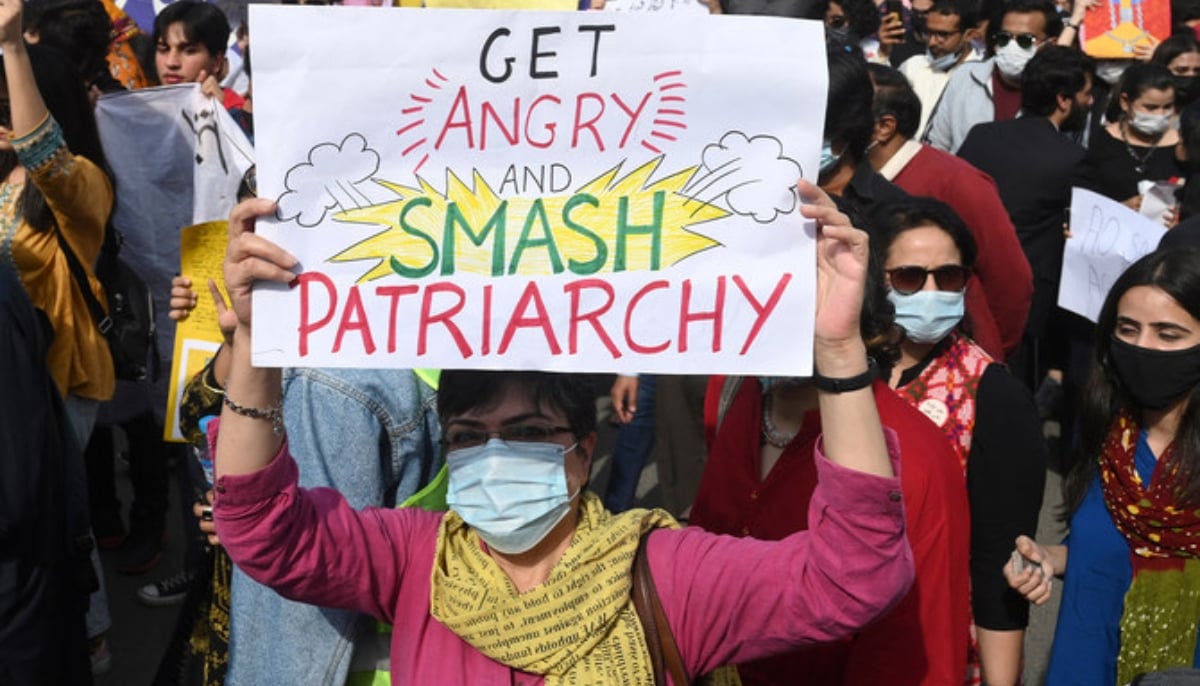
While Dr Fatima stressed the immense need for women to gain an understanding of legal documents and their importance.
"Always make sure to read every legal paper you sign. I made the mistake of not reading the legal documents and later had to pay a very heavy price. But we women end up making these mistakes only because we are not aware of its long-lasting impacts," she advised.
Nida Tareen, an academic lawyer and principal of the School of International Law, said the main barrier that restricted women from being independent or excelling in life was lack of financial freedom.
“There is an inherent belief ingrained in us that financial matters should be controlled by the male members of the family. This then allows for further issues to grow that we see in our society such as denial of inheritance rights, mismanagement or lack of awareness regarding the issue of haq meher etc.
“Women who work and earn are also not necessarily independent either as they usually can’t make any sort of financial decisions without the approval of a male head of the family," Tareen explains.
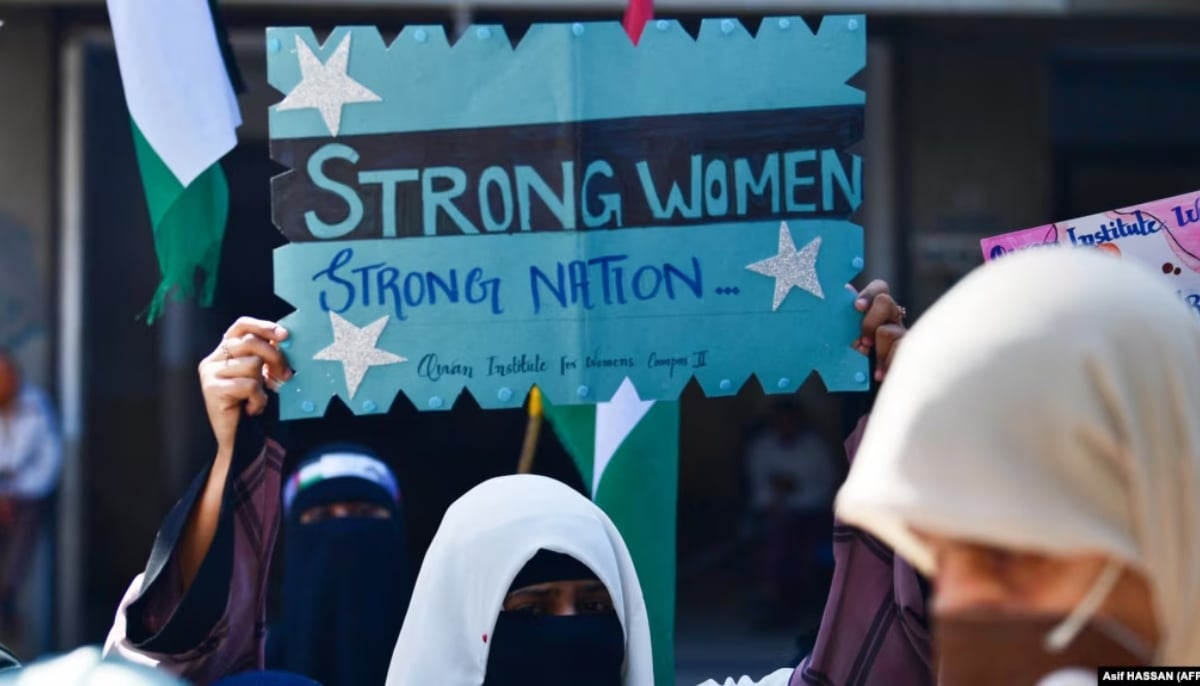
Also commenting on the issue of barriers, Islamabad High Court Advocate Mariyum Samar Qureshi said that the two main hurdles faced by women included the enforcement of laws by the courts and police and the need for greater awareness of their rights both in the social and professional context.
"This second barrier is particularly challenging for women in the workplace and public sector, where they often experience discrimination, exploitation, and a general lack of confidence towards their gender.
“Recently, workplace harassment laws have brought more attention to their struggles, though this is just a small part of the broader issue," Qureshi said speaking to Geo.tv.
Despite living in a modern, technologically advanced world where women are seen as equals, deep-rooted patriarchy keeps them confined to outdated roles, denying them freedoms and fundamental rights.
However, it is now time to end patriarchy's control over women’s lives and bodies. To excel in life both in and outside the four walls of their home, it is crucial for women to stay informed about new laws and their rights to navigate any challenges, while the state should focus on educating, empowering, protecting, and ensuring justice for women.
R. Umaima Ahmed is a freelance journalist. She posts on X @umaimablogger
* A pseudonym has been used in place of a subject's name to protect identity.
Header and thumbnail illustration by Geo.tv



